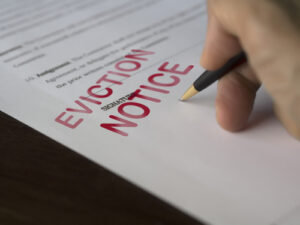Paying rent each month is crucial for tenants. However, rent prices are higher now than in previous years, making it hard for some tenants to make their rent payments. If you’re unable to pay rent, you must talk to your landlord and ensure you’re both on the same page. If you’re in a similar situation, read along as we go over what to do when you’re unable to pay rent and some potential solutions to help you.

Contents of This Article:
- What to Do If You’re Unable to Pay Rent
- Steps to Take Before Missing a Payment
- Common Consequences for Nonpayment of Rent
- Find a Housing Solution That Fits Your Budget
What to Do If You’re Unable to Pay Rent
Rent prices have been undoubtedly high in recent years, making it more difficult for some to pay rent. While it’s generally recommended to spend no more than 30% of your income on rent, that’s not realistic for everyone. If you find yourself unable to pay rent at any time, work with your landlord or property manager in Northern Virginia to find a solution. Follow these tips to help ease the situation or find a viable solution.
- Check Your Lease Agreement
- Communicate With Your Landlord
- Rethink Your Budget
- Look for Assistance Programs
- Know Your Tenant Rights
Check Your Lease Agreement

Before anything else, you’ll want to review your lease agreement to find out what it says about paying rent. Your lease will outline your landlord’s policy for late payments or nonpayment of rent. For instance, some landlords offer a grace period for late payments, while others apply fees immediately. Either way, most lease agreements detail late fees and procedures for paying rent late.
Communicate With Your Landlord
Communication is key when it comes to paying rent late. You must talk with your landlord and tell them you’ll be late with your payment. Explain why you can’t pay your rent on time and give some details about your circumstances to ensure you’re both on the same page. Additionally, if you can make a partial payment or know when you’ll have the money to pay, let them know your plan in writing.
Rethink Your Budget
Once you’ve talked with your landlord and have found a solution to pay either late or partial payment, you’ll want to look at your budget. There may be several reasons why you need more time to pay rent. For instance, you may have had a financially stressful month or a costly emergency. Either way, you’ll want to determine why you’re unable to pay rent.
Suppose you recently lost your job or find yourself deciding between rent or other necessary expenses. In that case, you’ll want to communicate your challenges with your landlord to see if you can work out a payment solution. If you cannot come to an agreement, it may be time to seek more affordable housing.
Look for Assistance Programs
If you’re about to face eviction or lease termination, consider finding an organization in your area to help you. Some groups that can offer help, resources, or assistance include the following.
- The Salvation Army– Your local Salvation Army can provide one-time assistance if you’re unable to pay rent and may provide funding for utility bills.
- Emergency Rental Assistance (ERA) Program– The ERA program gives eligible landlords and renters up to a year’s worth of rental assistance funds through state and local organizations.
- Modest Needs– The Modest Needs Foundation offers grants for up to $1000 as a one-time payment in case of an emergency.
- The U.S. Department of Housing and Urban Development– The HUD provides rent relief through its Section 8 clause. If you qualify for Section 8, the department will pay a large portion of your rent, while you’ll only be responsible for 30% of the monthly payment.
Know Your Tenant Rights
Regardless of the situation, knowing your rights as a tenant is crucial. You may be issued an eviction notice if you continuously miss rent payments or fail to pay rent without notice. However, eviction procedures and regulations differ depending on your state, city, or county. So, if you’re unsure of how the process works or what to do if you’ve been served a notice, you’ll want to do some research.
Steps to Take Before Missing a Payment
Each landlord or property management company handles late payments differently. For instance, some may be more lenient than others when it comes to late payments or issuing late fees. However, if you know that you’ll be paying rent late, there are certain steps you should take to ensure everyone’s on the same page.
- Give Your Landlord Notice- If you know you’ll miss a payment, inform your landlord as soon as possible. Ask your landlord in writing for a few extra days, if necessary.

- Explain Your Situation- When asking for an extension, briefly explain your situation and tell your landlord why you need more time. Explain your challenges and emphasize that they’re only temporary.
- Offer a Partial Payment- If you can, offer your landlord a partial payment to ensure some of the rent is paid on time. Then, give your plan for paying the rest of the amount owed in writing.
- Prepare for a Late Fee- Most landlords and property management companies have late fee policies for rent payments. So, even if you give your landlord notice that you’ll be late, you should still prepare to pay a late fee.
Common Consequences for Nonpayment of Rent
While it depends on your landlord or property manager, failing to pay rent often comes with some sort of consequence. Here’s what you can expect if you fail to pay rent on time or don’t pay it at all.
- Notice to Pay or Quit
- Opportunity to Pay or Leave
- Landlord Files for Eviction
Notice to Pay or Quit
If you fail to pay rent on time or within the grace period outlined in your lease, your landlord may send a notice to pay or quit. Unfortunately, this is the first step toward eviction proceedings. If you get a notice to pay or quit, you’ll want to pay your past-due rent immediately or find another housing solution as soon as possible. If you don’t pay within the timeframe specified in the notice, your landlord will continue with the eviction process.
Opportunity to Pay or Leave
Once you’re served a notice to pay or quit, you’ll either have to pay the bill or leave the premises. When you’re late with your rent, your landlord can issue a 30-day notice to pay or leave the lease. That said, regardless of what you decide to do, it’s crucial to communicate with your landlord or property manager during this time.

Landlord Files for Eviction
If you continue to not pay or communicate with your landlord about your situation, they’ll continue with the eviction process. While it takes time, once the court processes the paperwork, you and your landlord will attend a hearing. You’ll both have a chance to plead your case during this time. So, if you have any paperwork regarding your situation or communications with your landlord, bring it with you as evidence. Then, if the judge rules in favor of the landlord, you can appeal or leave the property within the given timeframe.
Find a Housing Solution That Fits Your Budget
If you find yourself unable to pay rent, it’s important to communicate that with your landlord. However, if the issue continues, it may be time to find a more affordable housing solution. Whether you think it’s best to downsize to a smaller apartment or find a roommate, your local property management team can help you find the right rental for you.
Professional Property Management In Northern Virginia has the expertise to help you find the perfect rental home for your needs. On the other hand, if you’re a landlord struggling to keep up with the day-to-day tasks of running your rental business, we can help with that, too. PPM offers comprehensive rental management services, including marketing, tenant screening, maintenance, and more. Contact PPM today to learn more about how we can help you!


Leave a Reply